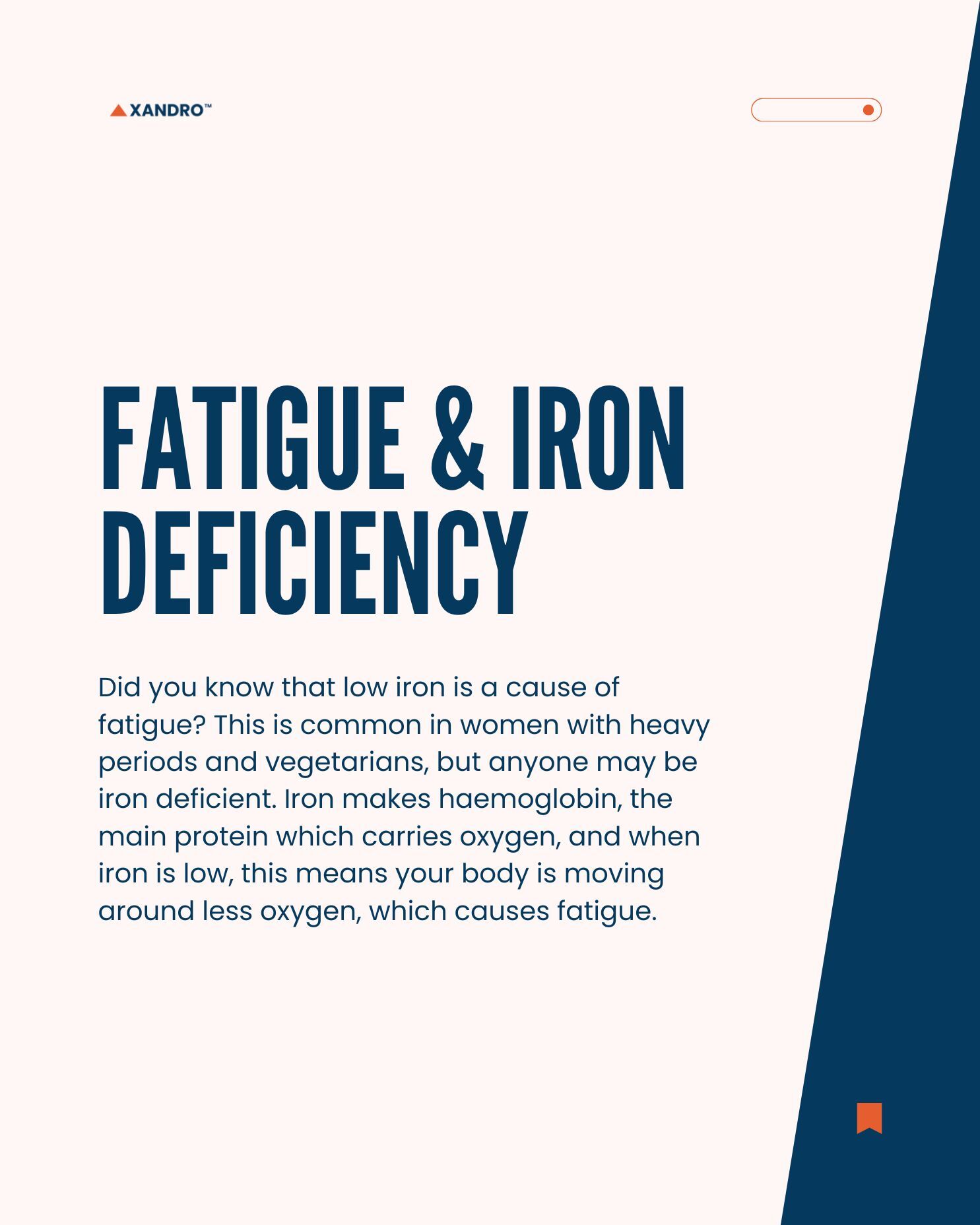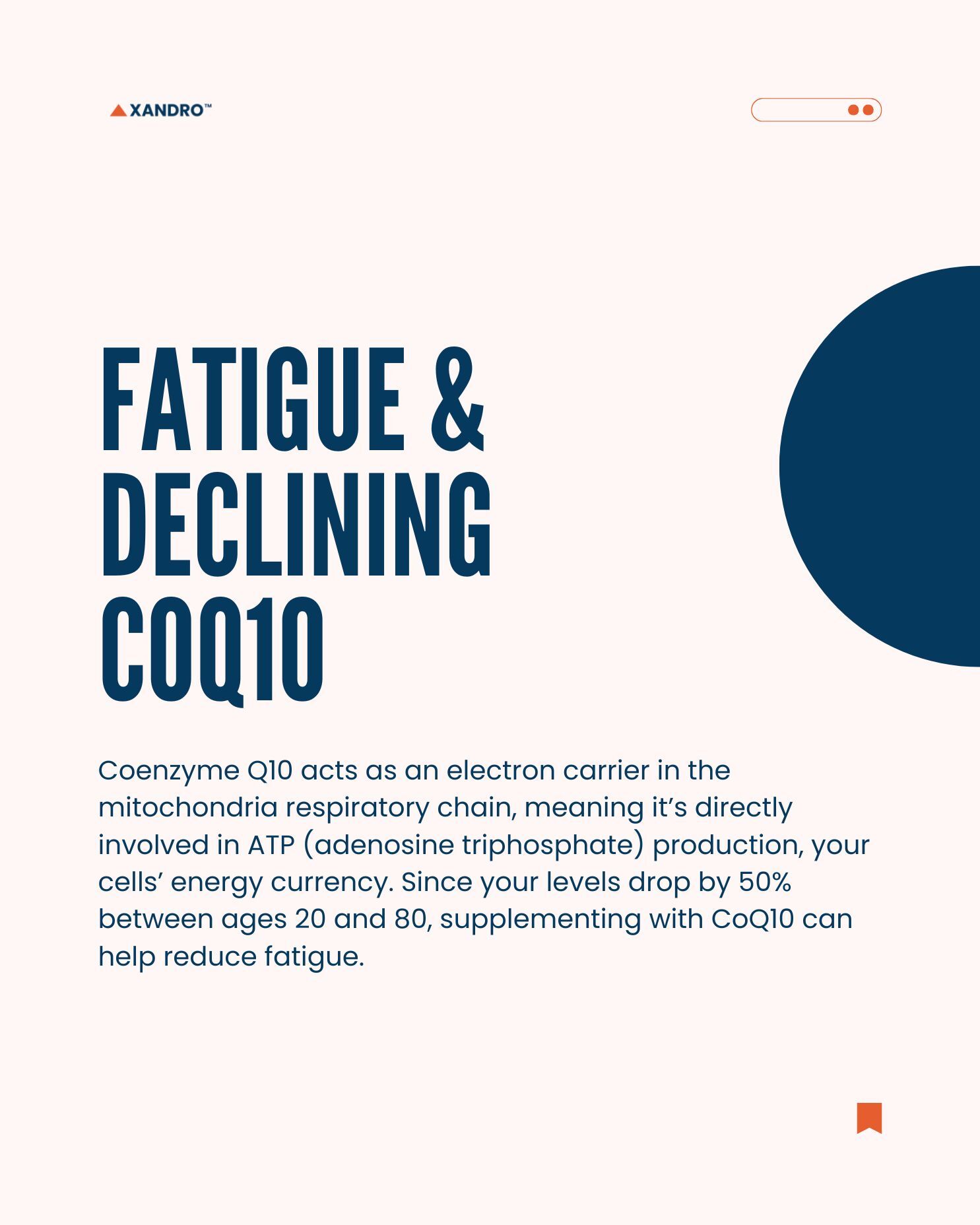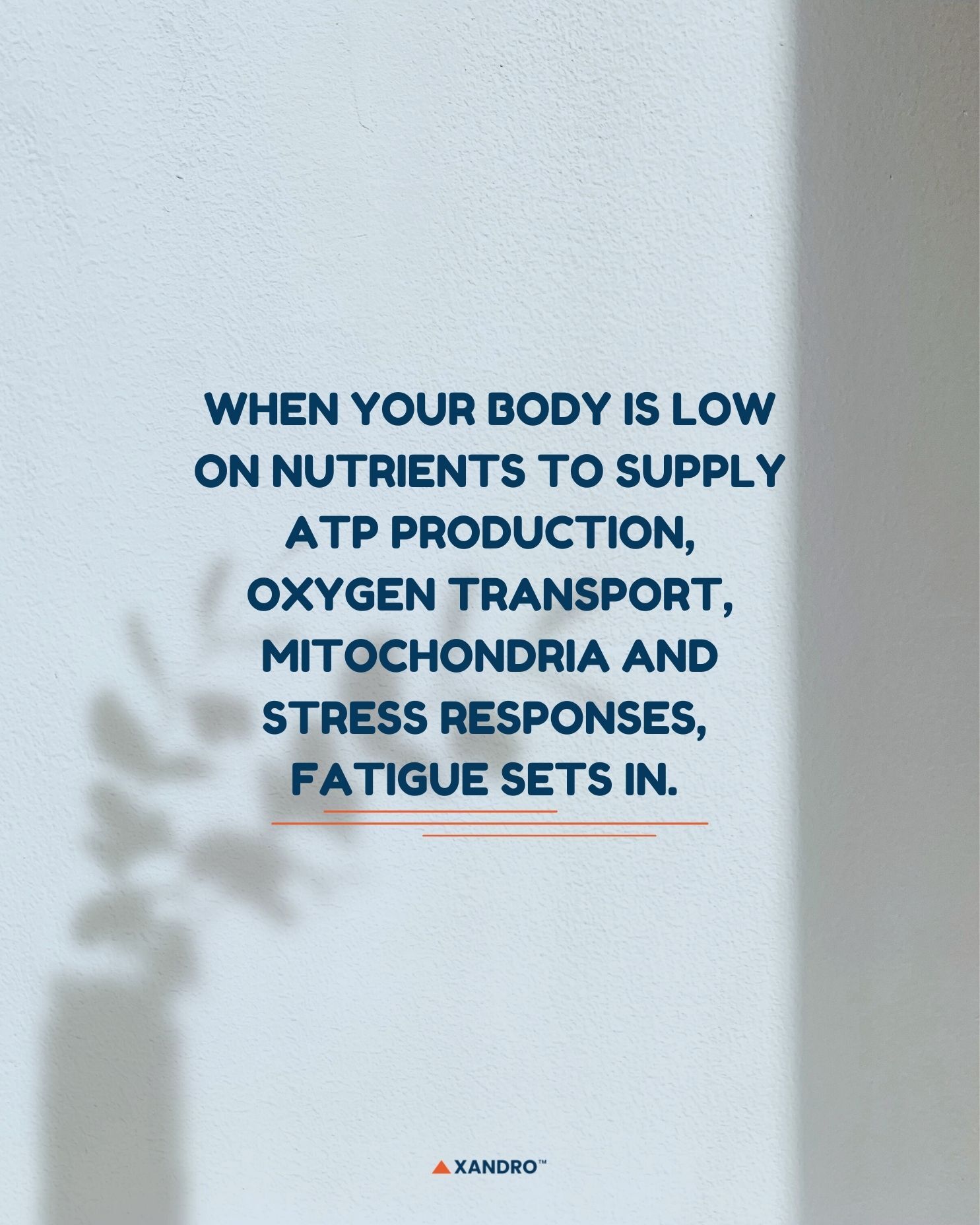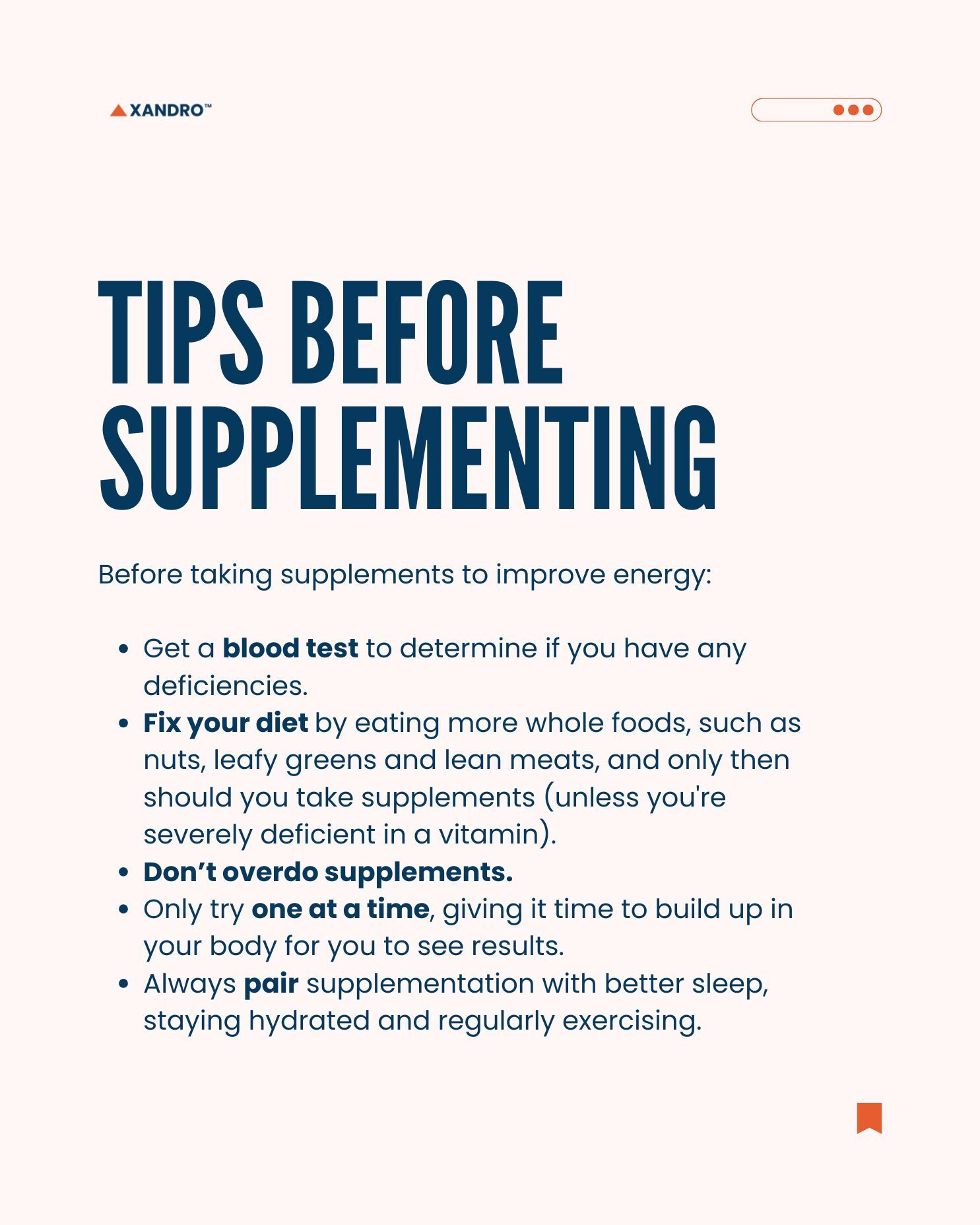Best Vitamins & Supplements for Energy & Fatigue Relief
21st Apr 2025
Top Energy-Boosting Vitamins & Supplements to Beat Fatigue Fast!
Feeling constantly tired? You’re not alone. Fatigue affects millions of people, whether due to stress, poor diet, or underlying health issues. While lifestyle changes like better sleep, exercise and a balanced diet are what we need to focus on, sometimes we need an extra boost.
That’s where supplements come in.
It’s hard to know where to start when researching what supplement is best for increasing energy and what vitamin is best for lack of energy? Let’s break down the science-backed choices to help you fight exhaustion naturally, discussing what vitamin is best for lack of energy, other supplements you can choose from and lifestyle tips to improve your health.
Head there now:
- How Fatigue Works: The Role of Nutrients
- Key Vitamins and Minerals for Energy
- Top Herbal and Natural Energy Boosters
- Quick Comparison: Best Supplements for Fatigue
- What’s the Best Supplement to Take for Fatigue?
- Final Tips Before You Supplement
- A Warning About Energy Supplements
- More Natural Ways to Beat Fatigue and Boost Energy
- When to See a Doctor
Products mentioned in this blog:
How Fatigue Works: The Role of Nutrients
Fatigue isn’t just about feeling sleepy, it’s often linked to how your body produces energy. Key processes include:
- ATP (adenosine triphosphate) production (your cells’ energy currency).
- Oxygen transport (iron and red blood cells).
- Mitochondrial function (CoQ10, magnesium).
- Stress response (adaptogens like ashwagandha).
When these systems are low on nutrients, fatigue sets in.
Key Vitamins and Minerals for Energy
1. Vitamin B Complex
In terms of vitamins and energy, B vitamins are what our bodies use to convert food into energy (ATP). This means that a deficiency in these vitamins can leave you feeling sluggish and mentally foggy. Let’s go over the 8 B vitamins and what they do:
- B1 (Thiamine): Helps convert carbohydrates into glucose (1.1mg/day for men, 1.2mg/day for women).
- B2 (Riboflavin): Supports energy production in cells, needed for fat metabolism and red blood cell production (1.1mg/day for men, 1.3mg/day for women).
- B3 (Niacin): Helps in converting nutrients into ATP (your body’s energy currency) and supports mitochondrial function (14mg/day for men, 16mg/day for women).
- B5 (Pantothenic Acid): Needed for breaking down fats and carbs, as well as coenzyme A production (6mg/day for men, 4mg/day for women).
- B6 (Pyridoxine): Supports brain function and mood regulation by creating neurotransmitters (1.3mg/day).
- B7 (Biotin): Helps metabolise amino acids (25mcg/day for men, 30mcg/day for women).B9 (Folate): Important for red blood cell production and the creation of DNA (400mcg/day).
- B12 (Cobalamin): Needed for nerve function and preventing fatigue (especially for vegans). Also supports red blood cell production. Low levels cause weakness and brain fog (2.4mcg/day).
Best for: People with poor diets, vegetarians/vegans or those under chronic stress.
Clinical Evidence: Multiple studies show that fatigue regresses and disappears when supplementing with B vitamins.
2. Vitamin D
For more vitamins for exhaustion, did you know that low vitamin D is linked to fatigue, muscle weakness and even depression? Depending on the country you live and your lifestyle, many people don’t get enough sunlight, reducing their vitamin D levels. If this is you, supplementation can help.
- Recommended dose: 600–2000 IU daily (higher doses may be needed if deficient).
- Best sources: Fatty fish, fortified foods, sunlight.
Best for: Those with limited sun exposure, darker skin tones or older adults.
Further Reading: All About Vitamin D
3. Iron
Iron deficiency is a leading cause of fatigue, especially in women with heavy periods or vegetarians. Iron makes haemoglobin, the main protein that carries oxygen. Basically, low iron means less oxygen, which equals fatigue.
- Signs of low iron: Pale skin, dizziness, shortness of breath.
- Best forms: Ferrous sulphate or bisglycinate (gentler on the stomach).
- Tip: Take with vitamin C (like orange juice) to boost absorption.
Types of Iron Supplements:
- Ferrous sulphate (20 per cent elemental iron): Most common, but may cause GI upset
- Ferrous bisglycinate (chelated form): Better absorbed, gentler on the stomach
- Heme iron polypeptides: Come from animal sources, most bioavailable
Absorption Boosters:
- Take with vitamin C (100–200mg)
- Avoid calcium, tea, or coffee within 2 hours
- Best taken on an empty stomach (if tolerated)
Clinical Note: A meta-analysis showed iron supplementation reduced fatigue in iron-deficient individuals.
Best for: Women, vegetarians, frequent blood donors.

4. Magnesium
Other than vitamins to boost energy, the mineral magnesium is needed for over 300 biochemical reactions in the body, including helping our muscles relax, supporting sleep, as well as being used in energy production.
- Signs of deficiency: Muscle cramps, insomnia, fatigue.
- Best forms: Magnesium citrate, glycinate, or malate.
- Food sources: Nuts, seeds, leafy greens, dark chocolate.
Best for: People with high stress, poor sleep, or muscle tension.
Take Xandro’s Magnesium Glycinate 500mg, one of the most absorbable forms of magnesium out there!
Further Reading: Can You Take Magnesium Glycinate After Drinking Alcohol?
Top Herbal and Natural Energy Boosters
5. Ashwagandha
This Ayurvedic herb modulates the hypothalamic-pituitary-adrenal (HPA) axis, reducing cortisol production and, therefore, helping the body manage stress, which can drain energy. It can also help with sleep and athletic performance.
- Benefits: Reduces cortisol (stress hormone), improves stamina.
- Dose: 300–500 mg daily.
- Works best for: Chronic stress, burnout, adrenal fatigue.
You can try Xandro’s Shoden® Ashwagandha 120mg to help with your stress and fatigue.
Further Reading: How Does Muscle Affect Metabolism?
6. Coenzyme Q10 (CoQ10)
If you’re looking for supplements for more energy, coenzyme Q10 acts as an electron carrier in the mitochondrial respiratory chain, directly involved in ATP production, but levels drop with age.
- Benefits: Supports heart health, reduces fatigue (especially in over-40s).
- Dose: 30–90mg per day, best taken with fatty foods, but you can take up to 200mg.
- Works best for: Older adults, those on statins (which deplete CoQ10).
Key Facts:
- Levels decline by 50 per cent between the ages of 20-80.
- Statins medications can reduce CoQ10 to 54 per cent.
- Two forms: Ubiquinone (oxidised) and Ubiquinol (reduced)
- A review of 13 studies found that CoQ10 helps reduce fatigue, both in healthy people and those with ongoing health issues. For people with chronic conditions, it took around 3 months to see results.

7. Rhodiola Rosea
This adaptogen increases sensitivity to serotonin and dopamine in the brain while protecting against oxidative stress. It’s also known for improving endurance and mental clarity.
- Benefits: Reduces mental fatigue, improves focus.
- Dose: 200–400 mg daily.
- Works best for: Busy professionals, athletes, students.
8. Ginseng
There are two primary types used for energy and cognitive function:
Asian Ginseng (Panax ginseng)
- Effects: Stimulating, improves mental clarity, combats fatigue.
- Best for: Short-term energy boosts, mental performance.
- Key Compounds: Ginsenosides (Rb1, Rg1).
American Ginseng (Panax quinquefolius)
- Effects: More calming, reduces stress-related fatigue.
- Best for: Long-term stress adaptation.
- Benefits: Supports mitochondrial function, helps the body handle stress better, improves oxygen delivery to muscles and brain, which boosts stamina, supports immune function.
- Dose: 200–400 mg daily.
- Works best for: Long-term fatigue, low immunity.
9. L-Theanine + Caffeine
L-Theanine (an amino acid in tea) helps you achieve calm focus, while caffeine provides alertness and energy. Together, they may reduce jitters while improving mental clarity.
L-Theanine increases alpha brain waves (linked to relaxed alertness), while caffeine blocks adenosine (the ‘tiredness’ neurotransmitter). This means that, when combined, they improve reaction time, focus and working memory.
- Why it works: L-theanine (found in tea) balances caffeine’s jittery effects.
- Best combo: 100-200 mg L-theanine + 50-100 mg caffeine.
10. Creatine
While famous in fitness, creatine is also one of the supplements for a lack of energy. It boosts brain energy, reduces mental fatigue and enhances endurance.
Creatine stores phosphate groups to rapidly regenerate ATP (energy molecules), it increases phosphocreatine in muscles and brain, allowing faster energy recovery, as well as supports mitochondrial function, reducing fatigue during prolonged effort.
- How it helps: Supports short bursts of energy (useful for mental fatigue, too).
- Dose: 3–5g daily, taken with carbohydrates to improve uptake.
Further Reading: Does Creatine Impact Sleep?
Quick Comparison: Best Supplements for Fatigue
|
Supplement |
Best For |
Key Benefit |
Recommended Dose |
|
Vitamin B Complex |
Low energy from poor diet or stress |
Converts food into energy |
As per label (B12: 2.4 mcg) |
|
Vitamin D |
Low sunlight exposure, winter blues |
Supports mood and muscle function |
600–2000 IU daily |
|
Iron |
Fatigue from anaemia (especially women) |
Boosts oxygen in blood |
8–18 mg (speak with your doctor) |
|
Magnesium |
Stress, muscle cramps, poor sleep |
Relaxes muscles, aids energy production |
200–400 mg daily |
|
Ashwagandha |
Stress-related exhaustion |
Lowers cortisol, improves resilience |
300–500 mg daily |
|
CoQ10 |
Age-related fatigue, heart health |
Enhances cellular energy |
100–200 mg daily |
|
Rhodiola Rosea |
Mental fatigue, burnout |
Increases focus and endurance |
200–400 mg daily |
|
Ginseng |
Long-term fatigue, low immunity |
Boosts stamina and mental clarity |
200–400 mg daily |
|
L-Theanine + Caffeine |
Focus, alertness without jitters |
Provides calm energy without crashes or jitters |
200–300mg daily |
|
Creatine |
Physical & mental endurance, recovery |
Rapidly generates ATP for sustained energy |
3–5g daily |
What’s the Best Supplement to Take for Fatigue?
The answer depends on your specific needs:
- If you’re always stressed → Ashwagandha or Rhodiola
- If you’re vegetarian/vegan → B12 + Iron
- If you’re over 40 or on statins → CoQ10
- If you have poor sleep → Magnesium
- If you feel weak or dizzy → Iron + Vitamin C
Final Tips Before You Supplement
- Get tested: A blood test can confirm deficiencies (especially for iron, B12 and vitamin D). This can help you determine which of the vitamins for tiredness you should take.
- Start with diet: Whole foods (nuts, leafy greens, lean meats) should be your first energy source.
- Don’t overdo it: Some supplements (like iron) can be harmful in excess.
- Trial one supplement at a time (to see what works).
- Give it 4-6 weeks (most take time to work).
- Combine with lifestyle changes: Better sleep, hydration and exercise make supplements more effective.
A Warning About Energy Supplements
Some energy boosters contain excessive caffeine, which can lead to crashes, unproven stimulants, like bitter orange, and hidden sugars, which worsen fatigue long term.
Stick to research-backed options and avoid quick fixes.
More Natural Ways to Beat Fatigue and Boost Energy
If you’re still feeling drained despite taking supplements, there may be other factors at play. There are other ways to help fight fatigue, from diet tweaks to lifestyle changes, so you can reclaim your energy naturally.
Foods That Naturally Increase Energy
What you eat plays a huge role in how energetic you feel. Some foods provide steady, long-lasting energy, while others cause crashes. Try to include more of these foods in your diet:
- Complex Carbohydrates: Unlike sugary snacks that lead to energy crashes, complex carbs provide slow-release fuel. Some of the best sources are oats, quinoa, sweet potatoes, brown rice and whole grain bread.
- Protein-Rich Foods: Protein helps stabilise blood sugar and keeps you full for longer. Make sure you eat plenty of eggs, lean meats, Greek yoghurt, lentils and tofu.
- Healthy Fats: Omega-3s and monounsaturated fats support brain function and energy. These can be found in foods such as avocados, nuts, seeds, olive oil and fatty fish (salmon, mackerel).
- Iron-Boosting Foods: Low iron = low energy. Pair iron-rich foods, such as red meat, spinach, lentils and pumpkin seeds, with vitamin C (citrus foods) for better absorption.
- Hydration Matters: Even mild dehydration can cause fatigue. Make sure you’re drinking water throughout the day. Herbal teas (like peppermint or ginger) can also help.
Further Reading: Fasting and Energy
Lifestyle Changes for More Energy
While supplements can help, they’re just meant to supplement, or go alongside, your lifestyle. Truly, daily habits make the biggest difference.
- Improve Sleep Quality: Poor sleep = next-day exhaustion. Try going to bed and waking up at the same time daily, avoiding screens one hour before bed and keeping your bedroom cool and dark.
- Move More: Exercise, even light exercise, boosts circulation and oxygen flow, reducing fatigue. Walk more, do yoga, swim, or even cycle.
- Manage Stress: We’re sure we’ve all experienced how stress zaps your energy, but can you imagine that stress building up each day? Chronic stress drains energy. Try meditation or deep breathing exercises, journaling to clear mental clutter and taking short breaks during work.
- Limit Caffeine & Sugar: Too much coffee or sweets can lead to energy crashes. Swap energy drinks for matcha (contains L-theanine for calm alertness).
When to See a Doctor
If fatigue persists despite lifestyle changes and supplements, it could signal an underlying issue like:
- Thyroid problems (hypothyroidism slows metabolism).
- Anaemia (low iron or B12).
- Sleep disorders (sleep apnoea, insomnia).
- Chronic fatigue syndrome (CFS).
Get checked if you experience extreme tiredness for weeks, unexplained weight changes and muscle weakness or dizziness.
End Note
If you’re wondering, ‘What can I take if I have no energy?’ the best approach is to identify the root cause. Vitamins to improve energy, like the B vitamins and vitamin D, along with adaptogens (ashwagandha, rhodiola) can help, but they’re not magic pills. Pair them with a healthy lifestyle for lasting energy.
Products mentioned in this blog:


